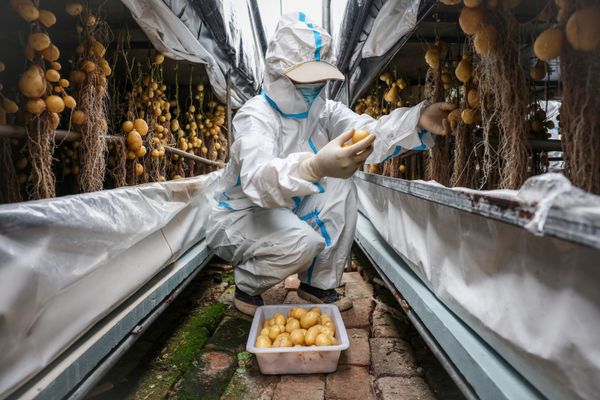YANQING, Nov 28 — In a research facility northwest of Beijing, molecular biologist Li Jieping and his team harvest a cluster of seven unusually small potatoes, one as tiny as a quail’s egg, from a potted plant.
Grown under conditions that simulate predictions of higher temperatures at the end of the century, the potatoes provide an ominous sign of future food security.
At just 136g, the tubers weigh less than half that of a typical potato in China, where the most popular varieties are often twice the size of a baseball.
China is the world’s biggest producer of potatoes, which are crucial to global food security because of their high yield relative to other staple crops.
But they are particularly vulnerable to heat, and climate change, driven by fossil fuel emissions, is pushing temperatures to dangerous new heights while also worsening drought and flooding.
With an urgent need to protect food supplies, Li, a researcher at the International Potato Centre (CIP) in Beijing, is leading a three-year study into the effects of higher temperatures on the vegetable. His team is focusing on China’s two most common varieties.
“I worry about what will happen in the future,” Li said. “Farmers will harvest fewer potato tubers, it will influence food security.”
Li’s team grew their crop over three months in a walk-in chamber set at 3ºC above the current average temperature in northern Hebei and Inner Mongolia, the higher-altitude provinces where potatoes are usually grown in China.
Their research, published in the journal Climate Smart Agriculture this month, found the higher temperatures accelerated tuber growth by 10 days, but cut potato yields by more than half.
Under current climate policies, the world is facing as much as 3.1ºC of warming above pre-industrial levels by 2100, revealed a United Nations report released in October.
Farmers in China say they are already feeling the effect of extreme weather events.
In Inner Mongolia, dozens of workers clutching white sacks rush to gather potatoes dug up from the soil before the next downpour.
“The biggest challenge for potatoes this year is the heavy rain,” said manager Wang Shiyi. “It has caused various diseases... and greatly slowed down the harvest progress.”
Meanwhile, seed potato producer Yakeshi Senfeng Potato Industry Company has invested in aeroponic systems where plants are grown in the air under controlled conditions.
Farmers are increasingly demanding potato varieties that are higher-yielding and less susceptible to disease, particularly late blight, which caused the Irish Potato Famine of the mid-19th century and thrives in warm and humid conditions.
“Some new and more aggressive (late blight) strains have begun to appear, and they are more resistant to traditional prevention and control methods,” said general manager Li Xuemin, explaining the Inner Mongolia-based company’s strategy.
The research by CIP, which is headquartered in Lima, is part of a collaborative effort with the Chinese government to help farmers adapt to the warmer, wetter conditions.
In the greenhouse outside Li’s lab, workers swab pollen on white potato flowers to develop heat-tolerant varieties.
Li says Chinese farmers will need to make changes within the next decade, planting during spring instead of the start of summer, or moving to even higher altitudes to escape the heat.
“Farmers have to start preparing for climate change,” Li said. “If we don’t find a solution, they will make less money from lower yields and the price of potatoes may rise.”
— Reuters


